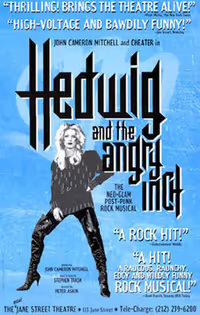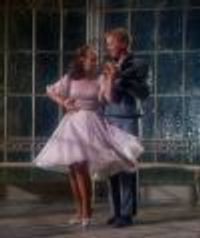Why are Non-Union tours so looked down upon ?
broadway guy
Broadway Legend Joined: 8/5/11
#1Why are Non-Union tours so looked down upon ?
Posted: 5/2/13 at 3:11pm
I understand that you want to see a Broadway tour filled with Broadway quality performers but it seems like (on here at least) That People wouldn't would spend a dime on a Non Union show.
Is there really that big of a difference between a Union touring show and a Non-union touring show besides the level of performers?
I also may not be understanding the complete difference between the two so please correct me if I am wrong, But this is what I understand about the difference:
1. A Non union show doesn't require all of the company to have Broadway Credits. Am I right?
2. If You want to audition for a Union show than you need an equity card and Non union tours don't require that?
3. Do you need an equity card to audition for a Non union show?
I know this is sort of a random question but I was looking through My 'Networks' beauty and the beast playbill and understood that this particular production wasn't a Union show. IMO the set was clearly not up to par with a Broadway show but I thought The Performers were great and I wouldn't mind seeing any of them on Broadway in BATB.
Thanks
#2Why are Non-Union tours so looked down upon ?
Posted: 5/2/13 at 3:21pm
Here is the info I can provide to the best of my knowledge:
You do not need an Equity card to audition for a Non-Equity production.
You do not need an Equity to card to audition for an Equity production, either. The Union members will be seen first, then it is up the director (I think it is the director, but may be wrong) gets to decide if he wants to see the Non-Union performers or not.
Hope this helps!
broadway guy
Broadway Legend Joined: 8/5/11
#2Why are Non-Union tours so looked down upon ?
Posted: 5/2/13 at 3:30pm
That does help, thank you.
"You do not need an Equity to card to audition for an Equity production, either. The Union members will be seen first, then it is up the director (I think it is the director, but may be wrong) gets to decide if he wants to see the Non-Union performers or not."
So what exactly is the point of the Equity card?
#3Why are Non-Union tours so looked down upon ?
Posted: 5/2/13 at 3:35pm
You have a better chance of being cast in a show, or even seen at an audition. Without an equity card, there is a good chance that you could wait all day at an audition and not be seen. If you have an equity card some casting agents may know you as well, and that always helps getting you cast in shows.
Updated On: 5/2/13 at 03:35 PM
#4Why are Non-Union tours so looked down upon ?
Posted: 5/2/13 at 3:37pm
IF the director has time and IF he decides he wants to see more people, then he will see SOME non-union actors. The vast majority of the time, you go to an Equity audition, wait around for hours until all the Equity people get seen, and then get told they are not seeing anyone else.
Is there really that big of a difference between a Union touring show and a Non-union touring show besides the level of performers?
I mean...isn't that enough of a difference? Also, tours go non-union after a few years, when they are trying to cut corners and reduce costs, so generally a non-union tour will be lesser quality all around.
That is not to say that non-Equity actors are necessarily less talented than Equity actors. I have worked with many incredibly talented young non-union performers. But there is a stigma, and it proves true often enough to stick around, unfortunately.
Everything in life is only for now. ~ Avenue Q
There is no future, there is no past. I live this moment as my last. ~ Rent
#5Why are Non-Union tours so looked down upon ?
Posted: 5/2/13 at 3:37pm
You came up with an original thread, broadway guy.

broadway guy
Broadway Legend Joined: 8/5/11
#7Why are Non-Union tours so looked down upon ?
Posted: 5/2/13 at 3:44pmLOL I would tell you to shut up Clyde but I am actually proud of myself for this, so thanks!
#8Why are Non-Union tours so looked down upon ?
Posted: 5/2/13 at 3:46pm

broadway guy
Broadway Legend Joined: 8/5/11
#9Why are Non-Union tours so looked down upon ?
Posted: 5/2/13 at 3:51pm
GingeBreadman: Does A Director HAVE to see all people with an equity card?
"That is not to say that non-Equity actors are necessarily less talented than Equity actors. I have worked with many incredibly talented young non-union performers. But there is a stigma, and it proves true often enough to stick around, unfortunately."
That makes sense. You seem to know a lot about this so I just have a few more questions:
1. Do any Non Union shows have a replica of the Broadway show or is it always different?
2. How many shows do you need to be in before you get the Equity card. How does that process work?
3. Have there always been non union and union shows or is this a new thing?
#10Why are Non-Union tours so looked down upon ?
Posted: 5/2/13 at 3:59pm
Generally, if an Equity actor has an audition, then it will have been scheduled through the Equity office (so, yes, the director will see all of the Equity auditions).
There are different ways to become an Equity member. In some cases, if you are non-union and get a role in an Equity production, you must join Equity. You can also be in productions at Equity-approved theatres and earned points (through the Equity Membership program - once you get a certain number of points, you become Equity).
I am giving a very general overview, but you can find details at their website: http://www.actorsequity.org/home.asp
shobizpro
Chorus Member Joined: 5/1/13
#11Why are Non-Union tours so looked down upon ?
Posted: 5/2/13 at 4:08pm
"So what exactly is the point of the Equity card? "
Another point to add: AFAIK, once a non-equity actor gets a part in an equity production, the onus is on the producers to sponsor the actors admission to the union. The actor pays the fees, but I don't think you can simply buy a card without a production's referral.
The issue I have personally with non-union shows is that the producers/promoters charge the same tickets prices for stripped down bare bones shows. A production I worked in the late nineties that took 100 people to load in, 35 people to run, and 25 trucks to move is currently touring with a crew of 12 in 4 trucks. Our cast then are, in many cases, Broadway staples now, The current cast mostly college kids and regional theater actors.
everybody has to start somewhere, but guess who's reaping the rewards of those cost saving measures?
shobizpro
Chorus Member Joined: 5/1/13
#12Why are Non-Union tours so looked down upon ?
Posted: 5/2/13 at 4:11pmSame, same Updated On: 5/2/13 at 04:11 PM
shobizpro
Chorus Member Joined: 5/1/13
#13Why are Non-Union tours so looked down upon ?
Posted: 5/2/13 at 4:11pm
Duplicate message ![]() Updated On: 5/2/13 at 04:11 PM
Updated On: 5/2/13 at 04:11 PM
eatlasagna
Broadway Legend Joined: 10/6/04
#14Why are Non-Union tours so looked down upon ?
Posted: 5/2/13 at 4:15pm
I've always liked this explanation of becoming equity from Nicholas Hytner from the Making of Miss Saigon... it starts at the 4:00 mark
http://www.youtube.com/watch?v=kfL4ej3EEHI
#15Why are Non-Union tours so looked down upon ?
Posted: 5/2/13 at 4:21pm
You can't buy your way into Equity; you have to be cast in an Equity production. The one exception to this is if you are already a member of SAG/AFTRA. Then you can buy your Equity membership.
Equity auditions are not scheduled by the Equity office, as stated above. Some Equity auditions are scheduled in advance by the production's casting team and the actor's agent/manager (if she/he has one). Others are Open Calls, where you line up early and sign up for a time to come back and be seen. Just showing up is not a guarantee of getting an audition slot.
Casts of Equity tours are not required to have a Broadway credit.
Equity membership is in no way a guarantee of talent or skill. There are lots of bad Equity actors; conversely, there are many excellent non-Equity actors - for instance, outside New York, many actors choose to stay out of the union because there are increasingly more and more employment opportunities for non-union actors in most of the country. These non-union actors often spend much more time performing than most actors who hold union membership, but are only rarely employed as performers.
#16Why are Non-Union tours so looked down upon ?
Posted: 5/2/13 at 4:21pm
1. Do any Non Union shows have a replica of the Broadway show or is it always different?
Non-Equity tours have non-union actors, but everyone else (musicians, stagehands) are union. Those are more likely to be replicas of the Broadway production. Non-union tours have no union members, so you may have to alter/simplify the production.
If a tour is produced by the same producers as the Broadway production, they will probably use the Broadway sets and costumes, since they own them (if the Broadway show has closed, of course). If a tour is being marketed as a tour of the Broadway show, chances are it will look pretty similar. The original direction and choreography can be used as long as the producers pay royalties.
Once the tour has been out for a few years and is now in smaller theaters than before (another cost-cutting technique), some of the sets may need to be altered to fit a smaller stage.
So it may not be an exact replica, but for marketing purposes, it is usually pretty close, at least to an untrained eye.
2. How many shows do you need to be in before you get the Equity card. How does that process work?
Check out the link that GilmoreGirl posted. There are many ways to join the union, and unfortunately not a set number of shows or years. It could be one lucky break or it could be a decade of earning points in regional theater.
3. Have there always been non union and union shows or is this a new thing?
Union shows have been around as long as the union, obviously (100 years). I don't know for sure, but I think there have probably always been non-union shows, but they may originally only have been amateur. I don't know the exact history.
However, the non-union touring market and the whole touring business model have kind of taken shape over the last couple decades, I think since the mega musicals of the 80s, when production costs skyrocketed because people wanted bigger and bigger productions, so producers needed to find a way to make touring more lucrative. There are a bunch of changes they made to the touring model around then (and it is always evolving as the market and economy change), and non-union touring is one of those changes. There are entire management companies now who only do non-union tours.
Everything in life is only for now. ~ Avenue Q
There is no future, there is no past. I live this moment as my last. ~ Rent
shobizpro
Chorus Member Joined: 5/1/13
#17Why are Non-Union tours so looked down upon ?
Posted: 5/2/13 at 4:35pm
"Union shows have been around as long as the union, obviously (100 years). I don't know for sure, but I think there have probably always been non-union shows, but they may originally only have been amateur. I don't know the exact history.
However, the non-union touring market and the whole touring business model have kind of taken shape over the last couple decades, I think since the mega musicals of the 80s, when production costs skyrocketed because people wanted bigger and bigger productions, so producers needed to find a way to make touring more lucrative. There are a bunch of changes they made to the touring model around then (and it is always evolving as the market and economy change), and non-union touring is one of those changes. There are entire management companies now who only do non-union tours."
True. There have always been non- union shows. The recent trend has been the sheer number of non-union/non-equity shows playing in union venues. Another trend is the size and scope of shows. When I first began touring, there were 5 or 6 large shows playing multi-month engagements in major markets and it seemed like a new one or two were mounted every year. AFAIK, Wicked and The Lion King are the only two left. More telling is that the most successful new show in a decade, BoM, went out and is playing mostly 1-2 week stops, as are most of the other tours currently on the road.
#18Why are Non-Union tours so looked down upon ?
Posted: 5/2/13 at 4:59pm
Are Equity Principal Interviews a thing of the past? I know actors hated them, but when my husband was doing them for the Hal Prince office, they were a chance for actors to get their photos and resumes--along with notes on their general physical type and personality--into the Prince office files.
And many union members who met my husband in an AEA interview later invited him to come see them in NY area shows. If they were good, he might well become a champion for them when it came time to cast a new show or tour.
Of course, seeing him wasn't the same as seeing Joanna Merlin (his boss), much less Prince himself. But it was more useful than sitting in your apartment.
***
newintown is right that views of union and non-union productions vary greatly the farther you get from New York. In Los Angeles, where there is a lot of work, but much less union theater, many, many fine actors are members of SAG and AFTRA, but never bother to pay for an Equity card.
Updated On: 5/2/13 at 04:59 PM
broadway guy
Broadway Legend Joined: 8/5/11
#19Why are Non-Union tours so looked down upon ?
Posted: 5/2/13 at 5:34pmThanks for all the info everyone! The Video was very educational.
#20Why are Non-Union tours so looked down upon ?
Posted: 5/2/13 at 5:47pmI have a question of my own to add: I know that Jennifer Damiano got her Equity card after being cast in Spring Awakening. She didn't have a card, and I doubt at her age then she was able to sit around and wait to see if she'd be seen. I know she had done some professional work beforehand, but not Equity. Is it possible to get auditions for Equity when you're non-Eq if you have a good agent?
#21Why are Non-Union tours so looked down upon ?
Posted: 5/2/13 at 5:54pm
Sometimes, Equity shows hold open calls, which means non-union actors will have the opportunity to audition. Of course, you have to line up at the crack of dawn or before. Spring Awakening held open calls. They probably also had agent appointments. I'm unsure whether Jenn Damiano had an agent appointment, attended an Equity audition, or was seen at an open call, but those are the three likely possibilities.
Not all musicians in non-union tours are union musicians. Some touring companies don't require union musicians.
You can't be in Equity and perform in a non-union show. You can be non-union and perform in an Equity show, depending on the type of production.
AEA AGMA SM
Broadway Legend Joined: 8/13/09
#22Why are Non-Union tours so looked down upon ?
Posted: 5/2/13 at 5:55pmboggess, that all depends on how the producers are running the auditions. For some shows, especially something like Spring Awakening where they were specifically looking for young and up and coming actors, they will have days where they are taking appointments for both Equity and non-Equity, as well as possibly non-Equity open calls.
PatrickDennis92
Stand-by Joined: 9/25/12
#23Why are Non-Union tours so looked down upon ?
Posted: 5/2/13 at 6:46pmNon union tours tend to be non union to cut costs so that the tour can play smaller markets-- there are lots of towns that can't accept the big shows because the market won't bear the ticket prices of a big equity show. As such, the non equity tour is usually designed to be a "watered down" version of the Broadway or other first-class production. Again, it's not saying the shows are bad, but it is saying the shows are less expensive to produce, and less expensive to watch. So that's why they are considered "lesser" products... because they, literally, are.
FindMe12
Chorus Member Joined: 3/14/12
#24Why are Non-Union tours so looked down upon ?
Posted: 5/2/13 at 6:56pmOne good example I can think of a tour turning non equity and not loosing much quality was the Hairspray Tour, I saw the equity tour and later the non equity tour and they seemed exactly the same.
Videos







